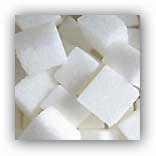News and Insights for
your best life. Online since 1998
- Home Health
- Breaking news
- In caso di...
- Per saperne di
più... - Medicina occidentale
- Medicine complementari
- Medicina cinese
e agopuntura - Omeopatia
- Fitoterapia

For this cross-sectional study, researchers aimed to elucidate whether higher glycosylated hemoglobin (HbA1c) and glucose levels exert a negative impact on memory performance and hippocampal volume and microstructure in a cohort of healthy, older, nondiabetic individuals without dementia.

Sugar
In 141 individuals (72 women, mean age 63.1 years ± 6.9 SD), memory was tested using the Rey Auditory Verbal Learning Test. Peripheral levels of fasting HbA1c, glucose, and insulin and 3-tesla MRI scans were acquired to assess hippocampal volume and microstructure, as indicated by gray matter barrier density.
Linear regression and simple mediation models were calculated to examine associations among memory, glucose metabolism, and hippocampal parameters.
Lower HbA1c and glucose levels were significantly associated with better scores in delayed recall, learning ability, and memory consolidation.
In multiple regression models, HbA1c remained strongly associated with memory performance. Moreover, mediation analyses indicated that beneficial effects of lower HbA1c on memory are in part mediated by hippocampal volume and microstructure.
Even in the absence of manifest type 2 diabetes mellitus or impaired glucose tolerance, chronically higher blood glucose levels exert a negative influence on cognition, possibly mediated by structural changes in learning-relevant brain areas.
Therefore, strategies aimed at lowering glucose levels even in the normal range may beneficially influence cognition in the older population, a hypothesis to be examined in future interventional trials.
Authors and references
Kerti L, Witte AV, Winkler A, Grittner U, Rujescu D, Flöel A.
Source
From the Departments of Neurology (L.K., A.V.W., A.W., A.F.) and Biostatistics and Clinical Epidemiology (U.G.), NeuroCure Cluster of Excellence (A.V.W., A.F.), and Center for Stroke Research Berlin (U.G., A.F.), Charité-University Medicine, Berlin; and Department of Psychiatry (D.R.), University of Halle, Germany.
For more information
http://www.ncbi.nlm.nih.gov/pubmed/24153444
MDN
del Dott. Turetta
Quali sono i problemi o le disfunzioni che possono giovarsi di un intervento omeopatico d'urgenza e, di conseguenza, come dovrebbe essere un ideale armadietto medicinale omeopatico casalingo.- Home -
- Health -
- Depressione -
- Sexuality
- Environment -
- Food -
- Musica -
- Capirsi -
- Grafologia -
- Ridere
Copyright © 1998/2018 www.mybestlife.com tutti i diritti sono riservati eccetto quelli già di altri proprietari.
.In caso di
Pubblicità
Per saperne di più su
Pubblicità
Pubblicità
Pubblicità
Pubblicità


